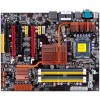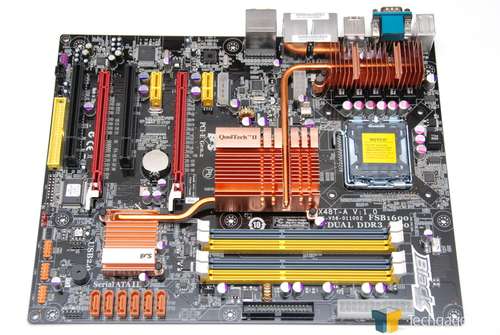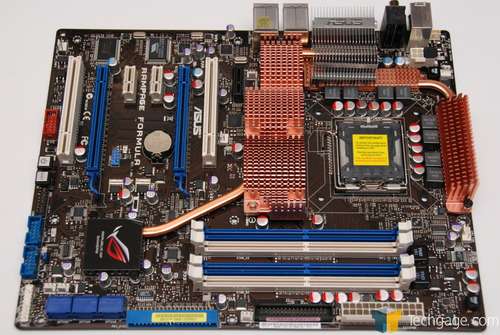- Qualcomm Launches Snapdragon 4 Gen 2 Mobile Platform
- AMD Launches Ryzen PRO 7000 Series Mobile & Desktop Platform
- Intel Launches Sleek Single-Slot Arc Pro A60 Workstation Graphics Card
- NVIDIA Announces Latest Ada Lovelace Additions: GeForce RTX 4060 Ti & RTX 4060
- Maxon Redshift With AMD Radeon GPU Rendering Support Now Available
X48 Roundup: ASUS, ECS & Intel

With so much X48 selection on the market, choosing the right board can be tough. To help make the choice easier, we are taking a look at three such boards all at once, ASUS’ DDR2 Rampage Formula and also the DDR3 ECS X48T-A and Intel’s DX48BT2.
Page 13 – Final Thoughts
With three boards in question, where do we begin? The first place might be to recognize that all three boards we took a look at here come in at a different price-range. The ECS X48T-A is the lowest of the bunch, at ~$200, becoming one of the least expensive X48 offerings on the market. This is followed by the Intel DX48BT2, which hovers around ~$250.
Then we have the robust ASUS Rampage Formula, which also carries the robust price of ~$300. The common saying is that you don’t always get what you pay for, but in the case of these three boards, that’s exactly the case.
The ECS is one of the most lackluster motherboards I’ve tested in the three years of Techgage’s existence. I wanted to like the board, but so many things frustrated me. The board’s layout has many faults and the BIOS also carries its own set of issues.
The overall lack of polish doesn’t instill the confidence that you’ve just purchased a great board either. Even the driver CD autoloads an installer that’s reminiscent of an application built with a free software application. Then add to the fact that it doesn’t even run in 64-bit Windows. There’s just so much lacking here.
The Intel board was a vast improvement over the ECS board, because it offered a more common-sense way of doing most things. Certain components on the board itself are still located in odd locations, but nothing is show-stopping.
Like other previous Intel boards I’ve tested, the overclocking here was not that ideal, and the same applies also to the ECS. So for overclocking, neither of these two should be considered. The Intel board at least has the benefit of a great-looking design and caters to the goal of ultimate stability.
Then we have the ASUS Rampage Formula, which is by far the best board out of these three. But, it’s also the most expensive, again coming back to the “pay what you get for” statement. The Formula was fun and reliable to overclock, offers the best board design of all seven tested boards and includes plentiful accessories and extras. This is one case where the extra $50 is actually going to be worth it.
All of that said, the fact of the matter is, either of these boards should offer good performance for those who want to run their machine at stock speeds. All three offer Crossfire, though the S-ATA ports might be a problem for larger cards, and all three also offer support for at least a 400MHz FSB. So for those who don’t care to overclock and would rather run their machine at stock, either of the three should serve the purpose.
It will all come down to your price-range. I doubt many would disagree that $300 is a lot for a motherboard, so the ASUS offering might be out of the reach for many. But even at the lower-end, at the $200 price-point of the ECS, better motherboards can be had if you don’t need Crossfire support, such as the P45-based ASUS P5Q Deluxe, which would personally be my first choice out of all of them. It didn’t overclock as high as we liked, but it packed in enough to make the price tag feel like a bargain.
The good thing is that right now, the choice is fantastic. There is a board at every price-point, so as long as you know what you expect from the one you have your eyes on, you shouldn’t be too disappointed.
If you have a comment you wish to make on this review, feel free to head on into our forums! There is no need to register in order to reply to such threads.
Support our efforts! With ad revenue at an all-time low for written websites, we're relying more than ever on reader support to help us continue putting so much effort into this type of content. You can support us by becoming a Patron, or by using our Amazon shopping affiliate links listed through our articles. Thanks for your support!








